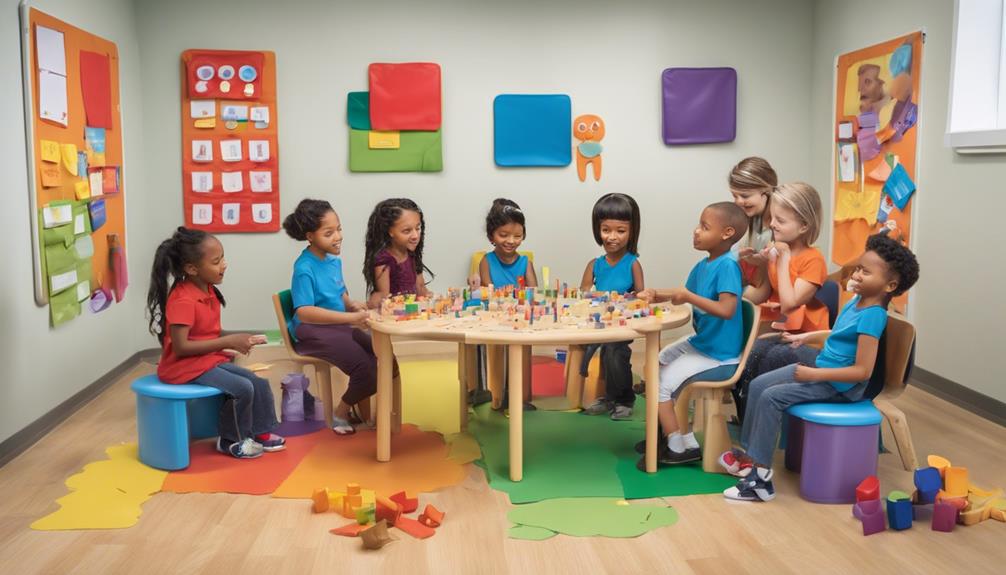When it comes to speech therapy exercises, they act as guides for our communication skills, like a compass in unfamiliar terrain. Exploring five crucial exercises designed to enhance communication abilities could make a significant impact.
From vocal warm-ups to articulation drills and breathing techniques, each exercise holds a unique power to unlock clearer speech patterns. Mastering these techniques not only refines our speech but also opens doors to improved confidence and autonomy.
Let's uncover the impact of these exercises on communication and beyond.
Key Takeaways
- Vocal warm-up exercises enhance voice clarity and reduce strain for improved communication skills.
- Articulation drills focus on speech sounds, improving pronunciation and speech intelligibility effectively.
- Breathing techniques regulate airflow, enhancing speech clarity and fluency through controlled breathing methods.
- Tongue twisters strengthen speech precision and fluency, beneficial for articulation enhancement and targeted speech sounds.
Vocal Warm-Up Exercises
To enhance vocal readiness and communication effectiveness, incorporating vocal warm-up exercises before speaking engagements is crucial. These exercises aren't just about preparing the voice physically but also mentally for effective communication.
By engaging in vocal warm-ups such as humming, lip trills, sirens, and tongue twisters, individuals can improve voice clarity, projection, and overall speech quality. Vocal warm-up routines play a vital role in maintaining vocal health by reducing strain and fatigue on the voice, ultimately preventing potential voice-related issues in the long run.
Consistent practice of these exercises can also enhance articulation, expand vocal range, and ensure that the voice is in optimal condition for any speech or presentation. Therefore, integrating vocal warm-up exercises into a regular routine is essential for anyone looking to enhance their communication skills and maintain a healthy voice.
Articulation Drills

Enhancing speech clarity and precision through targeted articulation drills is a key aspect of improving communication skills. Articulation exercises focus on specific speech sounds or letter combinations to strengthen tongue and lip muscles crucial for clear articulation.
By engaging in repetitive practice of challenging sounds such as 'r' or 's', individuals can significantly enhance their pronunciation skills. These drills are versatile and can be tailored to address the unique speech difficulties of each individual effectively.
Consistent practice of articulation drills not only improves speech intelligibility but also enhances overall communication skills. Through tailored drills and consistent effort, individuals can overcome barriers to clear communication and achieve greater confidence in expressing themselves effectively.
Breathing Techniques for Clarity
Improving communication skills involves mastering breathing techniques that enhance clarity and speech precision. Deep breathing exercises help regulate airflow, essential for sustaining vocal sounds and improving articulation. Diaphragmatic breathing techniques enhance lung capacity, aiding in vocal projection. Controlled breathing reduces speech interruptions, maintaining fluency. Additionally, relaxation through breathing exercises alleviates tension in vocal muscles, promoting smoother speech production.
| Breathing Technique | Description | Benefits |
|---|---|---|
| Deep Breathing | Involves inhaling deeply through the nose, expanding the diaphragm, and exhaling slowly through the mouth. | Regulates airflow for clearer speech. |
| Diaphragmatic Breathing | Focuses on breathing deeply into the diaphragm, expanding the belly, and controlling exhalation. | Enhances lung capacity and vocal projection. |
| Controlled Breathing | Involves breathing in slowly, holding for a few seconds, and exhaling steadily, regulating airflow. | Reduces speech interruptions and maintains fluency. |
Implementing these techniques in speech therapy can significantly improve communication skills, aiding in clarity, fluency, and overall confidence.
Tongue Twisters for Precision

Exploring the world of tongue twisters offers a fun and effective way to enhance speech precision and articulation skills. Tongue twisters are a valuable tool in speech therapy for improving clarity and addressing speech errors. They involve practicing challenging word combinations to target specific speech sounds, helping individuals strengthen the necessary tongue and lip muscles for clear speech. Consistent practice of tongue twisters can lead to improved fluency and accuracy over time.
Here are some benefits of incorporating tongue twisters into your speech therapy exercises:
- Enhances articulation and clarity
- Targets specific speech sounds
- Strengthens tongue and lip muscles
- Addresses speech errors and fluency
- Improves speech precision through consistent practice
Role-Playing Scenarios
Engaging in role-playing scenarios provides a dynamic way to practice and enhance real-life communication skills. These scenarios offer a safe and controlled environment to apply communication skills, allowing individuals to navigate various social interactions with confidence. Through role-playing, participants can experiment with different communication styles and approaches, honing their abilities to adapt to different situations effectively.
One of the significant benefits of role-playing is the opportunity for feedback. Constructive feedback from peers or professionals involved in the scenarios can help individuals improve their communication strategies, identify areas for growth, and refine their skills. This direct input aids in developing a deeper understanding of effective communication techniques and fosters continuous improvement.
Frequently Asked Questions
Can Speech Therapy Improve Communication Skills?
Yes, speech therapy can significantly enhance communication skills. It improves speech clarity, language understanding, and social interactions.
Customized therapy plans target specific challenges, boosting confidence and independence. These strategies equip us with vital tools for success in personal, academic, and professional environments.
Therapy fosters effective communication strategies, aiding individuals of all ages in developing essential skills for improved interaction and overall quality of life.
How Can I Improve My Communication Skills Exercises?
We can enhance communication skills through various methods:
- Active listening
- Role-playing
- Visualization
- Recording conversations
- Seeking feedback
These methods help us understand and address areas needing improvement. By actively engaging in these exercises, we can become more effective communicators in various contexts.
It's essential to practice regularly and remain open to feedback to continually refine our communication abilities.
What Exercises Do Speech Therapists Do?
We often conduct various exercises to improve communication. These include:
- Articulation drills for clearer speech
- Oral motor exercises to strengthen mouth muscles
- Vocal exercises for better intonation
- Breathing techniques to aid in proper speech delivery
Additionally, language development activities are incorporated to enhance vocabulary and communication skills. Each exercise serves a specific purpose in enhancing overall communication abilities.
What Is the Blowing Exercise for Speech Therapy?
Blowing exercises in speech therapy are beneficial for improving oral motor skills and strengthening mouth muscles. These activities, such as blowing bubbles or cotton balls, target specific muscles involved in speech production. They can enhance articulation, speech clarity, and breath control, leading to better communication.
Children can engage in these exercises to develop the strong oral muscles necessary for clear speech. Incorporating blowing exercises into therapy sessions can be both enjoyable and effective for speech development.
Conclusion
In conclusion, incorporating speech therapy exercises into your daily routine can greatly improve your communication skills. While some may find these exercises challenging or time-consuming, think of them as tools to help you become a more confident and independent communicator.
Just like going to the gym to strengthen your muscles, speech therapy exercises are essential for strengthening your speech clarity and fluency. With consistent practice, you can achieve success in various aspects of your life.










